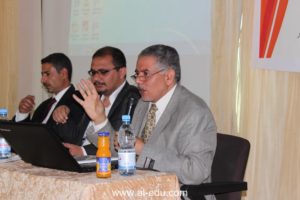Seminar on “Public Health & Health Education”
A seminar on “Public Health & Health Education” was held at Faculty of Medical Sciences last Thursday Dec 22, 2016 with the participation of faculty members, staff and students.
The seminar was meant to cast the light on the significance of Public Health Discipline in the field of health education. It also highlighted the important role of Public Health professionals in providing health care and disease control to the community.
Delivering the opening speech, Prof Abdullah Tahish stressed on the importance of such a discipline since the absence of health education might lead to the aggravation of health problems and, thus, the community’s collapse.
According to him, an increasing interest in health education has been paid by civil organizations. For, heath outreach enhances the development process since sustainable development depends on man as a key element.
Dr. Abduraqeeb El-Hanani (Head of Public Health Department) presented an overview of the discipline, its role and position in the general health system, and the various fields where public health professionals are required.
He further explained how the syllabus structure at Al-Nasser is based on the standard medical specialty. The outcome health professionals, therefore, are qualified enough to help improve the community’s health care, protect against diseases, and consolidate hygienic norms.
Dr. Saif El-Shami (Director of Health Education at Ministry of Health) delivered a speech in which he highlighted health education: the important part played by the health professionals; protection against health problems; controlling strategies; and communication channels.
He pointed out that health education is an essential part of primary health care. It principally works out through the outreach centers that raise awareness over the protection against diseases and enhance the hygienic norms so as to reduce health risks.
In his paper, Dr. Mohammed Qasim (Director of Epidemic Surveillance) introduced the concept of epidemic surveillance and its relationship with the public health. He noted to the two surveillance systems used in Yemen: the paper system and the electronic one (known as early warning system).
He presented a detailed review on the systems’ mechanism as well as on how to deal with a given statement and the choice of surveillance centers.
For his part, Dr Jawad El-Wabr (instructor of Public Health & Environmental Safety) noted to the diversity of this field in terms of career prospects. A public health professional can get a job in the different universities, schools, companies, factories, state offices, and organizations.
In addition, the students can continue postgraduate studies in the following fields: environment; environmental & professional safety; health care; school health; nutrition; health statistics; education & awareness-raising; water and environmental sanitation; health management; etc.
Participating in the seminar, Public Health students Rawia Tahi (first level) and Hamzah Muthana (fourth level) talked about the reasons behind choosing such a discipline, their impressions over the study, and ambitions for future career.
![IMG_3853 [al-edu.com]](http://www.al-edu.com/wp-content/uploads/2016/12/IMG_3853-al-edu.com_.jpg)
![IMG_4018 [al-edu.com]](http://www.al-edu.com/wp-content/uploads/2016/12/IMG_4018-al-edu.com_.jpg)
![IMG_4013 [al-edu.com]](http://www.al-edu.com/wp-content/uploads/2016/12/IMG_4013-al-edu.com_.jpg)
![IMG_4004 [al-edu.com]](http://www.al-edu.com/wp-content/uploads/2016/12/IMG_4004-al-edu.com_.jpg)
![IMG_3994 [al-edu.com]](http://www.al-edu.com/wp-content/uploads/2016/12/IMG_3994-al-edu.com_.jpg)
![IMG_3993 [al-edu.com]](http://www.al-edu.com/wp-content/uploads/2016/12/IMG_3993-al-edu.com_.jpg)
![IMG_3975 [al-edu.com]](http://www.al-edu.com/wp-content/uploads/2016/12/IMG_3975-al-edu.com_.jpg)
![IMG_3902 [al-edu.com]](http://www.al-edu.com/wp-content/uploads/2016/12/IMG_3902-al-edu.com_.jpg)
![IMG_3878 [al-edu.com]](http://www.al-edu.com/wp-content/uploads/2016/12/IMG_3878-al-edu.com_.jpg)
![IMG_3877 [al-edu.com]](http://www.al-edu.com/wp-content/uploads/2016/12/IMG_3877-al-edu.com_.jpg)
![IMG_3865 [al-edu.com]](http://www.al-edu.com/wp-content/uploads/2016/12/IMG_3865-al-edu.com_.jpg)
![IMG_3854 [al-edu.com]](http://www.al-edu.com/wp-content/uploads/2016/12/IMG_3854-al-edu.com_.jpg)
Search
News

Al-Nasser University Football Team Qualifies for Aqsa Flood Championship Finals
In the presence of Prof Abdullah Tahish, the Ch...
Al-Nasser University Holds 2022/2023 Convocation in Prime Minister’s Presence
The annual academic convocation was held by Al-...
NU Holds Workshop for Designating and Approving FMS Master Programs by CAAQA Standards
In the presence of Prof Abdullah Tahish, the Ch...
Chancellor Inspects Progress of 1445 AH (2023/2024) 1st Semester at FMS
An inspecting visit was made by Prof Abdullah T...
Chancellor Inspects Progress of 1445 AH (2023/2024) 1st Semester at FMS & FAFS
An inspecting visit was made by Prof Abdullah T...

